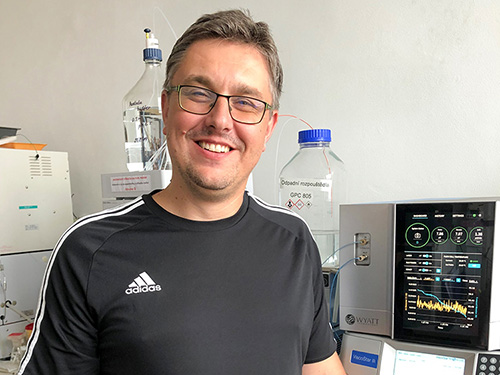Featured Customer: Libor Kostka, Ph.D.

Dr. Libor Kostka is Principal Scientist in the Department of Biomedical Polymers of the Institute of Macromolecular Chemistry of the Czech Academy of Sciences in Prague, Czech Republic. He kindly agreed to discuss his career path and development of drug-delivery polymers, and how Wyatt instruments play a central part in their characterization.
I grew up in in south Bohemia and I was interested in natural science since my college studies and thus I decided to study chemistry at the University of Chemistry and Technology in Prague. I did my Ph.D. under the supervision of Prof. Karel Ulbrich at the Institute of Macromolecular Chemistry of the Czech Academy of Sciences. He was the person who introduced me to an exciting area of polymer research that might help treat serious diseases such as various forms of cancer. I decided to work in the Department of Biomedicinal Polymers headed by Prof. Etrych and contribute to the development of polymers applicable in medicine. My research interests include synthesis and characterization of various structural polymers based on N-(2-hydroxypropyl) methacrylamide (HPMA) that is frequently used as a drug-delivery material. Proper characterization of the prepared polymers in terms of their molar mass distribution, structure and ability to react with active pharmaceutical ingredients is vital for understanding the behavior and application properties of polymers developed in our group.
Our Wyatt instruments, which include several MALS detectors, an Optilab®, a ViscoStar®, an Eclipse™ and most recently a DAWN® with online DLS and a DynaPro® NanoStar®, are crucial for the characterization of polymeric drug carriers, polymer-antibody conjugates, and the behavior of these systems under different conditions. We have found that batch dynamic light scattering is very quick and easy to use and thus can be used for a screening of large sample series. More detailed investigation of promising materials is then performed by MALS in combination with SEC or AF4. Using these techniques, we gain information that we would never see using just conventional SEC with column calibration. ASTRA®’s protein conjugate analysis in particular is an extremely helpful feature of this software.

Wyatt instruments… are crucial for the characterization of polymeric drug carriers, polymer-antibody conjugates, and the behavior of these systems under different conditions.
